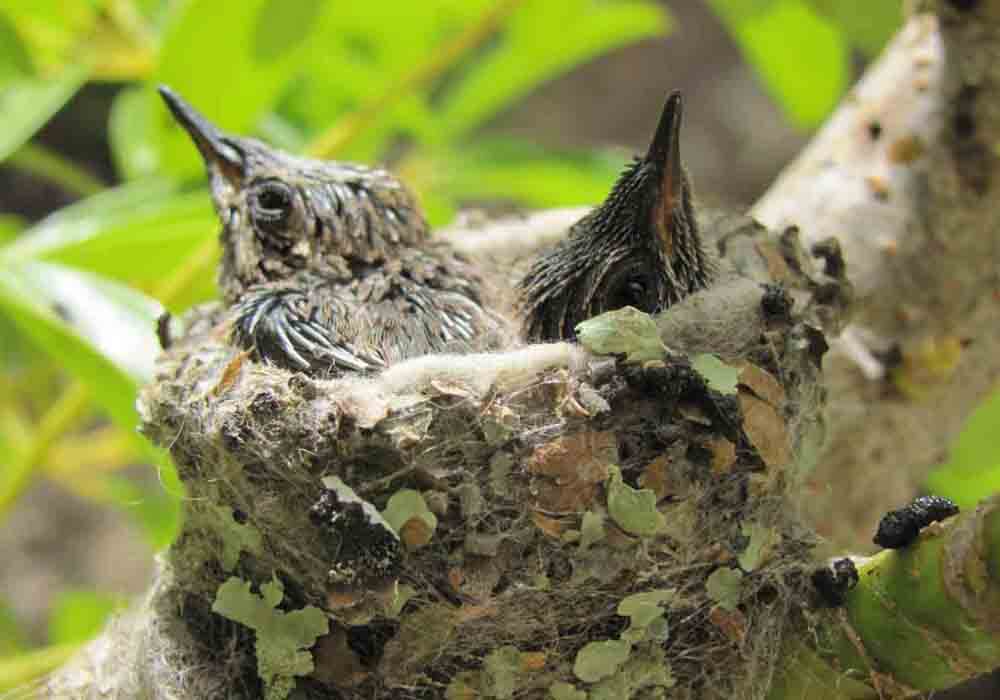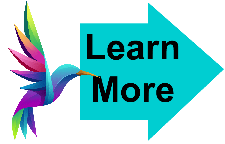What Do Baby Hummingbirds Eat?
For Such A Small Bird, Does It Eat Anything Special?
Baby hummingbirds are born without the ability to fly or feed themselves. For the first few weeks of their lives, they rely on their parents to bring them food and keep them safe. But what do baby hummingbirds eat?
Baby hummingbirds eat a combination of nectar and small insects such as spiders, flies, mosquitoes, aphids, bees, beetles, caterpillars, and gnats. The nectar provides the birds with the energy they need to grow and develop, while the insects offer protein and other essential nutrients.
In this article, I will talk through what baby hummingbirds eat, as well as how often and at what times of day they eat. I will also share more relevant information about them, so if you want to know more about baby hummingbirds, keep reading!

What Can You Feed a Baby Hummingbird?
You can feed a baby hummingbird a variety of insects, including spiders, flies, mosquitoes, aphids, bees, beetles, caterpillars, and gnats. You can also feed them nectar from flowers. These will give them the energy they need to grow and develop.
Insects
The majority of a baby hummingbird's diet is made up of insects. The protein in insects helps baby hummingbirds grow strong and develop their flight muscles. Parents will typically catch insects in mid-air and then tear them into small pieces for their babies to eat.
Nectar
In addition to insects, baby hummingbirds also drink nectar. Nectar gives them the sugar they need for energy. Unlike their adult counterparts, however, baby hummingbirds cannot yet fly from flower to flower to feed themselves. Instead, they wait for their parents to bring them food.

Parent Hummingbirds can be fussy eaters, so it's important to choose just the right feeder to make sure plenty of nectar gets back to it's babies. This helpful article of mine reviews the feeders Hummingbirds like the most...
Other Foods
When nectar is not available, baby hummingbirds can also consume tree sap, fruit juices, and honeydew. These foods provide them with the sugar they need for energy. However, they are not as nutritious as nectar and should only be fed to baby hummingbirds as a last resort.
How Often Do Baby Hummingbirds Eat?
Baby hummingbirds eat very frequently, about every 10-15 minutes. This level of food consumption is because they have a very high metabolism and burn through energy quickly.
Baby hummingbirds can consume up to half their body weight in a day. This means that if you have a baby hummingbird that weighs two grams (0.07 ounces), it could eat up to one gram (0.035 ounces) of food in a day.
Also, a baby hummingbird needs to drink more water than an adult since it urinates more frequently. It may drink up to eight times its body weight in a day. what do baby hummingbirds eat
Once a baby hummingbird gets a little older, and its stomach can hold more food, it will start eating every half hour. As it continues to grow, it'll eventually be able to go several hours without eating.
Do Baby Hummingbirds Eat at Night?
Baby hummingbirds do not eat at night. Nighttime is when baby hummingbirds do most of their growing. Their bodies will use the energy from the food they eat during the day to help them grow larger and stronger.
During the day, the mother hummingbird will forage for food and bring it back to the nest for her babies. She will feed her chicks by regurgitating food into their mouths–a movement that looks similar to sword swallowing. When the sun goes down, the mother hummingbird will stop feeding her chicks, and they will go to sleep until morning.

What's the best way to attract Hummingbirds to your garden? In this informative article of mine, I offer the best tips to attract Hummingbirds so you'll have a greater chance this beautiful bird and their babies.
Common Problems That Can Occur With a Baby Hummingbird’s Diet
A baby hummingbird's diet may be affected by certain factors. Let’s take a look at a few of them.
Dehydration
One of the most common problems that can occur with a baby hummingbird’s diet is dehydration. Usually, this is because of a lack of nectar in the diet or because you’re feeding the hummingbird too much water.
To solve this problem, make sure that you're feeding your hummingbird a nectar solution that is at least 10% sugar and that you're giving them fresh water daily. Doing so will help ensure that your hummingbird stays hydrated and healthy.
Malnutrition
Another common problem that can occur with a baby hummingbird’s diet is malnutrition. This is often caused by feeding the hummingbird an incorrect nectar solution or by not offering enough food.
To solve this, feed your hummingbird a nectar solution that is at least 10% sugar and offer small meals frequently throughout the day. You may also need to supplement the hummingbird’s diet with vitamins and minerals.
Indigestion
The last common problem that can occur with a baby hummingbird’s diet is indigestion. This happens when you feed the hummingbird too much food or if you don’t give them enough water.
To avoid this, make sure you give the hummingbird small meals often and always offer a fresh water source.

Baby Hummingbirds tend to come with their parents who need food as well. This helpful article of mine is meant to inform you as to what you should (and should not) feed Hummingbirds.
Importance of a Balanced Diet for Baby Hummingbirds
What baby hummingbirds eat is critical to their development and health. In the wild, hummingbird parents feed their young a mixture of insects and nectar. However, if you're feeding a baby hummingbird in your backyard, you need to guarantee that you’re giving it a diet that is nutritious and balanced.
Tips for Providing a Healthy Diet for Your Own Baby Hummingbird
- Get a hummingbird feeder. The first step to providing a healthy diet for your baby hummingbird is to get a hummingbird feeder. This will provide your hummingbird with a steady supply of nectar, which is its primary food source. You can purchase a hummingbird feeder at most pet stores or online.
- If you need a recommendation, check out Auslar’s Garden Hummingbird Feeder (available on Amazon.com). It has a translucent glass bottle that can help you monitor the nectar easily and circular perches that will let your baby hummingbird rest while it eats.
- Fill the feeder with nectar. Once you have a hummingbird feeder, you will need to fill it with nectar. You can make your own nectar by mixing one part sugar with four parts water. Boil the mixture for two minutes to kill any bacteria, then let it cool before filling your feeder. Here's more indepth coverage about what they like to drink.
- Change the nectar every few days. It’s important to change the nectar in your hummingbird feeder every few days, as old nectar can spoil and lead to health problems for your hummingbird. When changing the nectar, be sure to clean the feeder thoroughly with hot water and soap to prevent the growth of bacteria.
- Provide fresh fruit. In addition to nectar, you should also provide your baby hummingbird with fresh fruit. Hummingbirds are especially fond of berries, so try to include some in their diet. You can also offer them other fruits such as melon, grapes, or bananas.
- Give them water. It is important to provide your baby hummingbird with fresh water, as they need it to stay hydrated. Give them water from a bowl or mist their cage with water from a spray bottle. Make sure to change the water every day as well, and clean their bowl or cage regularly to prevent the growth of bacteria.
- Feed them small meals often. Baby hummingbirds should be fed small meals often throughout the day. They have high metabolisms and need constant nourishment in order to grow and thrive. Try to offer them food every two hours or so during the day.
- Don’t overfeed them. While it’s important to provide your baby hummingbird with enough food, you should not overfeed them as this can cause problems in their health, like obesity or heart disease. Only offer them as much food as they can eat in one sitting, and remove any uneaten food from their cage after each mealtime.
- Consult a veterinarian. If you have any concerns about your baby hummingbird's diet, be sure to consult a veterinarian or a qualified avian specialist who can provide you with more specific advice.
What Do Baby Hummingbirds Eat?...Conclusion
I hope this article has answered what do baby hummingbirds eat. Remember, if you’re thinking about feeding a baby hummingbird, it’s important to provide them with a balanced diet that includes nectar, fresh fruit, and water. This will ensure that your baby hummingbird will grow up healthy and happy.
Back To The TOP Of This What Do Baby Hummingbirds Eat? Page

About the Author...
Richard Worden, a dedicated bird lover for over 20 years, I love to share my in-depth knowledge and passion for birds. Read more About Me and my expertise in this field.
- We Know Birds HOME ›
- Hummingbird Facts and Information ›
- What Do Baby Hummingbirds Eat?
